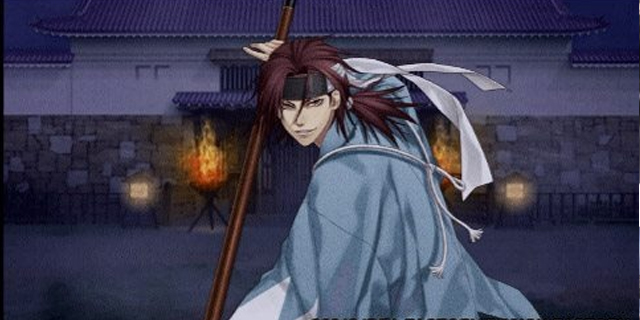
Otome games aren’t exactly the standard fare we get in the US. (For publisher Aksys Games, it’s probably the craziest localization idea they’ve ever done, and we’re including Fate/Extra.) Hakuoki: Demon of the Fleeting Blossom takes place during the chaotic Meiji restoration era of Japan, where you follow the lives and circumstances of the men of the Shinsengumi, a group of soldiers following the command of the Tokugawa shogunate. Biggest plus of the game? It’s one of the few localized Idea Factory titles that you wouldn’t be embarrassed to play in public.
An otome game is normally aimed towards a female market, one where one of the main goals is usually to develop a relationship between a female main character and several male leads. Most otome games tend to be visual novels, and Hakuoki is no exception. There’s not much gameplay to Hakuoki outside of the type of choices seen in a “Choose Your Own Adventure” book, all which determine what character you end up on better terms with and what route you end up on. Hakuoki takes its mechanics a step further, making it easy for the player to not get lost within its narrative (or get un-stuck in case you’re locked into a bad ending, something that can happen much more often than you might think).
As a result of taking place in a time period that not a lot of people are familiar, Hakuoki can tend to throw around a lot of unfamiliar terms that people might not be used to. The game’s in-game encyclopedia fixes this problem, by giving you a constantly updating source of definitions for all the game’s more confusing things, all just two button presses away and with minimal load times. Unlike other games, the encyclopedia is never used as a crutch for lazy storytelling, but as an added tool so the player never feels confused about any unfamiliar terms, or details about characters one might have forgotten. Another neat feature is the Record of Service, which lets you jump directly into any previously unlocked chapter rather than force the player to either start from the beginning or limit his game saves in any way. These two features might seem small, but they’re something I’ll definitely miss when playing other games of the same genre.
Talking about the game’s plot is a bit hard to do without revealing quite a few spoilers and plot twists, but it’s enough to say that I really enjoyed the game’s writing. The banter between the Shinsengumi members is often amusing and easy to follow, while the character’s actions and decisions are actually believable and not blatantly telling you what immediate or long term consequences your choices have. For a game that is pretty much all-or-nothing on it’s narrative and characters, this is something very nice to see.
This is definitely not a game for everyone. It’s really first game of it’s kind to ever be localized in the US, more so for it’s target audience than anything else. Still, there are enjoyable things to be read here, and it’s definitely a game worth picking up based on the premise alone.
Pros: Well-written, gracefully localized visual novel
Cons: Theme and genre just may not appeal to many



















